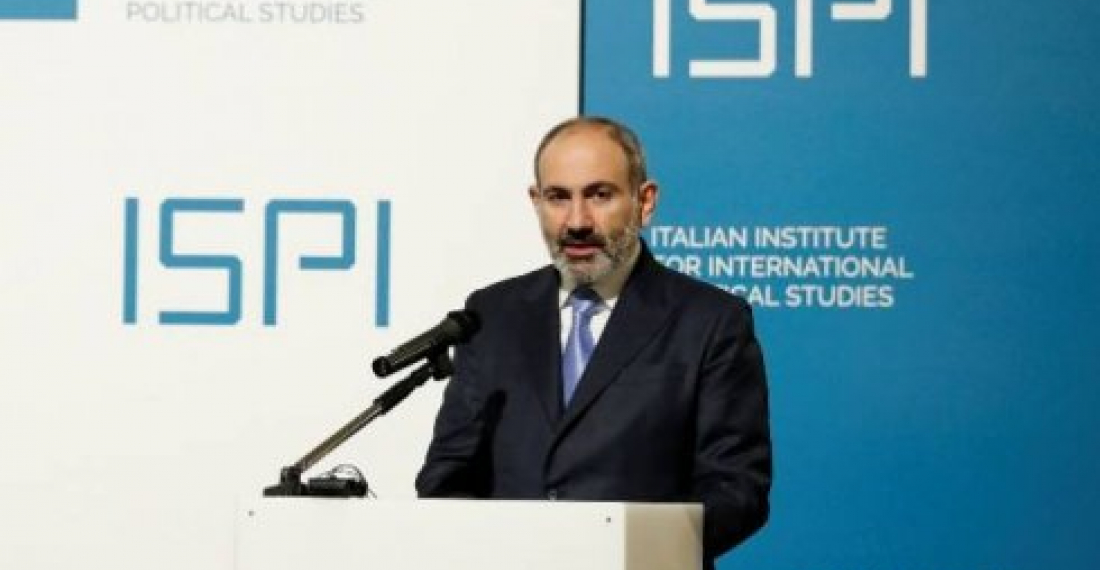Armenian leaders past and present, on Wednesday (20 November) spoke about the dangers of a new Karabakh conflict whilst addressing separate European audiences.
Armenia's former president, Serzh Sargsyan, addressed the issue whilst speaking at the conference of the European People's Party in the Croatian Capital, Zagreb where he was attending in his capacity as the leader of Armenia's former ruling party the Republican Party of Armenia. On the other side of the Adriatic Sea, in Milan, Italy, Armenia's current leader, Nikol Pashinyan was addressing an audience at Milan's Italian Institute for International Political Studies, on the first day of his official visit to Italy.
Serzh Sargsyan's speech in Zagreb was one of the first since relinquishing power in dramatic circumstances in May 2018 following street protests. Sargsyan used his speech to voice his frustration at the policies of the current Armenian government. But he also made reference to the Karabakh conflict, expressing concerns about the current stage of the negotiations for conflict settlement.
"As someone who participated in the liberation of Artsakh in person, I am well aware of the price for peace. From this perspective any negotiation, however inadequate, is preferred to war," he said. "It is very important for the mediation efforts of the OSCE Minsk Group Co-chairs to continue to receive unconditional assistance by the international community. Unfortunately, we see that Azerbaijan continues to arm itself and threaten Artsakh and Armenia. I want to reiterate my message for those in Baku to hear: Artsakh will never be a constituent part of Azerbaijan, and the issue has no military solution", Serzh Sargsyan said.
In Milan, the current Armenian leader, Nikol Pashinyan, gave one of the longest and most comprehensive overseas speeches since coming to power, during which he covered a number of domestic and foreign policy issues. A big chunk of Pashinyan's speech was dedicated to the Karabakh conflict, with the Armenian leader reiterating his mantra that a solution to the Karabakh conflict can only be achieved if it is supported by Armenia, Azerbaijan and Nagorno-Karabakh, whilst inviting the Azerbaijani leadership to express such a position. "I have told Ilham Aliyev that I am the first Armenian leader to announce that any solution to Nagorno Karabakh conflict should be acceptable for the peoples of Armenia, Nagorno-Karabakh and Azerbaijan. I suggest that Azerbaijani president should also make a similar announcement, since it's the main concept and platform for regional stability and peace", Pashinyan said. He added:
"Nagorno-Karabakh is a very difficult and painful issue for the peoples of the region. It cannot be resolved without hard and consistent efforts, without compromise, mutual respect and balance. But if we have taken responsibility for the future of our peoples, then we must make efforts to achieve real change. I mean the Government of Azerbaijan, the Government of Nagorno Karabakh and the Government of Armenia. We are sincere in our pursuit of peace in the region and are ready for a dialogue for the sake of a solution acceptable to the peoples of Armenia, Nagorno Karabakh and Azerbaijan. This is our approach, and we are ready to negotiate on the basis of this new paradigm."
Pashinyan's speech also expressed concerns about the current state of affairs, accusing Baku of preparing the population for war.
In a somewhat bizarre twist, the Armenian prime minister also warned his Italian audience that in case of a resumption of hostilities in Nagorno-Karabakh Azerbaijan can become a springboard for jihadists escaping from Syria to attack Europe.
Commonspace.,eu political editor said in a comment that "the fact that Sargsyan and Pashinyan both made major speeches in Europe on the same day is probably a coincidence. They both appear to be sounding the alarm bells about a possible new conflict in Karabakh, and this despite the fact that the situation in the conflict region has this year been reasonably calm and quiet. However both speeches need to be read also within the context of domestic Armenian politics, with reports of increasing discontent with the current government and with attempts by anti-Pashinyan forces to use the Karabakh issue as a rallying point. But whilst an Armenian audience is used to the rhetoric used by both Sargsyan and Pashinyan it is likely that the international audiences to who the speeches were addressed will be somewhat puzzled by it. And in Baku the speeches are likely to be met with disdain, and more rhetoric. It is very doubtful if any of this is helpful to a Karabakh conflict settlement."
source: commonspace.eu with agencies
photo: Nikol Pashinyan addressing an audience in Milan on 20 November 2019 (picture courtesy of the press service of the prime minister of Armenia)







